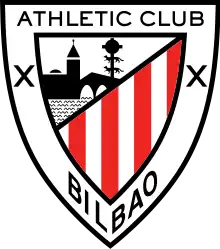 | |||
| Full name | Athletic Club "B" | ||
|---|---|---|---|
| Nickname(s) | Los Leones / Lehoiak (The Lions) Los Cachorros / Katxorroak (The Cubs) | ||
| Founded | 1964 | ||
| Ground | Lezama (Field 2) | ||
| Capacity | 3,250 | ||
| Chairman. | Jon Uriarte | ||
| Manager | Carlos Gurpegui | ||
| League | Segunda Federación – Group 2 | ||
| 2022–23 | Primera Federación – Group 2, 20th of 20 (relegated) | ||
|
| |||
Athletic Club "B", commonly known as Bilbao Athletic, is the reserve team of Athletic Club, a football club based in Bilbao, in the autonomous community of Basque Country in Spain. The team are playing in the Segunda Federación – Group 2. Founded in 1964, the team holds home matches at the small stadium attached to the club's training facility at Lezama, holding 3,250 spectators[1] or occasionally at San Mamés Stadium, with its 53,500-seat capacity, for important fixtures.
Reserve teams in Spain play in the same football pyramid as their senior team rather than a separate league. However, reserves cannot play in the same division as their senior team. Therefore, Bilbao Athletic are ineligible for promotion to La Liga. Reserve teams are also no longer permitted to enter the Copa del Rey. In addition, only under-23 players, or under-25 with a professional contract, can switch between senior and reserve teams. In recent years, most of Bilbao Athletic's players have been graduates from the club's youth setup ('cantera') via the feeder team, Basconia. As a result of Athletic's signing policy, only Basque players feature also for the reserve team.
History
The Bilbao Athletic name was first used in 1938 during the Spanish Civil War, when both La Liga and the Copa del Rey were suspended; most of the top Athletic players had joined the Euzkadi XI, a team put together at the suggestion of José Antonio Aguirre, the president of the Basque Country (and himself a former Athletic Bilbao footballer). Euzkadi went on tour to raise funds for the Basque cause, and also played in the Mexican domestic league. However, at home the Campeonato de Vizcaya had resumed in 1938. With their best players abroad with Euzkadi, Athletic could only field weakened sides and, to avoid possible shameful results damaging the club's reputation, chose to enter under the name Bilbao Athletic (the name was derived from the two clubs that merged in 1903 to become Athletic Bilbao – Bilbao Football Club and Athletic Club).[2] Despite the low expectations, they still won the championship and entered the 1939 Copa del Generalísimo.
.jpg.webp)
The name was revived in 1964, when Athletic Bilbao decided to establish a reserve team with Agustín Gaínza as coach. The new Bilbao Athletic initially played in local regional leagues before winning promotion to Tercera División in 1966, under Rafa Iriondo; in 1969 they first reached Segunda División.
In 1983–84, with José Ángel Iribar as coach, and an emerging Julio Salinas as striker, the reserves finished in second place, only trailing Castilla CF; both teams were ineligible for promotion, and Salinas won the Pichichi.
Bilbao Athletic dropped back down to the third level in 1996, but the main squad continued to be nurtured with several players who had spells with the reserves.

After 19 seasons in the Segunda División B, Bilbao Athletic returned to the second tier after defeating Cádiz CF, 3–1 on aggregate, in the promotion playoffs.[3] However, in their campaign in the Segunda they were reliant on the same group, a core squad of 20-year-olds who had never played at such a high level before, and despite battling performances in most of their games, a pattern of narrow defeats led to the team finishing bottom and being relegated back down at the first attempt.[4] Somewhat ironically, the promoted teams that season were CD Leganés whose squad included three players on loan from Athletic who would have been eligible to play for Bilbao Athletic that season, as well as the parent club's local rivals Alavés and Osasuna.
The team came close to another promotion in 2020–21, losing to Burgos after extra time in the final round of the promotion play-offs[5] (they had lost in the opening round in 2018 and 2020).
Premier League International Cup
Athletic have competed in the Premier League International Cup (an Under-23 tournament, all matches played in England), with most of the players selected for their squad drawn from Bilbao Athletic plus some younger additions from Basconia and the Juvenil squads (the rules permit the use of a limited number of overage players, but Athletic do not use them). In 2014–15, 2015–16 and 2016–17 the club qualified from their group but were eliminated in the quarter-finals, while in the 2017–18,[6] 2018–19 and 2019–20 editions, they bowed out at the group stage.
Background
- As farm team:
- Club Atlético de Bilbao Amateur (1964–66)
- Bilbao Atlético Club (1966–72)
- Bilbao Athletic Club (1972–91)
- As reserve team:
- Athletic Club B (1991–2006)
- Bilbao Athletic (2006–)
Season to season
- As a farm team
|
|
- As a reserve team
|
|
- ↑ Before the start of the competition
- 14 seasons in Segunda División
- 2 seasons in Primera Federación/Primera División RFEF
- 31 seasons in Segunda División B
- 1 season in Segunda Federación
- 10 seasons in Tercera División
- 2 seasons in Categorías Regionales
Players
Current squad
- As of 30 August 2023.[7]
Note: Flags indicate national team as defined under FIFA eligibility rules. Players may hold more than one non-FIFA nationality.
|
|
Reserve team
Note: Flags indicate national team as defined under FIFA eligibility rules. Players may hold more than one non-FIFA nationality.
|
Out on loan
Note: Flags indicate national team as defined under FIFA eligibility rules. Players may hold more than one non-FIFA nationality.
|
|
Coaching staff
| Position | Staff |
|---|---|
| Head coach | |
| Assistant head coach | |
| Analyst | |
| Goalkeeping coach | |
| Fitness coach | |
| Psychologist | |
| Physiotherapist | |
| Medical services | |
| Nurse | |
| Kit manager | |
| Match delegate | |
Honours
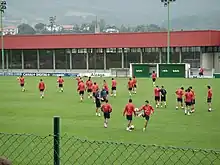
- Segunda División B:[lower-alpha 1] 1982–83,[lower-alpha 2] 1988–89[lower-alpha 2]
- Tercera División:[lower-alpha 1] 1966–67,[lower-alpha 3] 1968–69[lower-alpha 4]
- Biscay Championship: 1938–39
Notes
- 1 2 Third tier
- 1 2 Promoted directly
- ↑ Not promoted in 1967 play-offs
- ↑ Not promoted in 1969 play-offs
Stadium
For big matches, they use San Mamés, the first team stadium.
Selected coaches
 Javier Clemente
Javier Clemente Agustín Gaínza
Agustín Gaínza José Ángel Iribar
José Ángel Iribar Rafa Iriondo
Rafa Iriondo Ignacio Izagirre (284 matches)
Ignacio Izagirre (284 matches) Iñaki Sáez (290 matches, record)[8]
Iñaki Sáez (290 matches, record)[8] José Ángel Ziganda (242 matches)
José Ángel Ziganda (242 matches)
Notable players
Note: This list includes players that have appeared in at least 100 top league games and/or have reached international status.
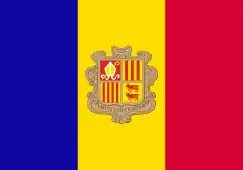
 Justo Ruiz
Justo Ruiz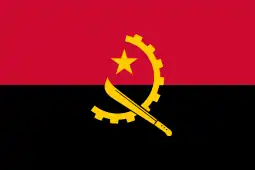
 Jonás Ramalho
Jonás Ramalho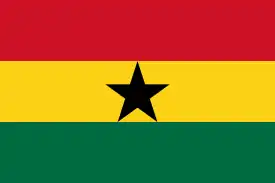
 Iñaki Williams
Iñaki Williams Aritz Aduriz
Aritz Aduriz Borja Agirretxu
Borja Agirretxu Ustaritz Aldekoaotalora
Ustaritz Aldekoaotalora Edu Alonso
Edu Alonso Joseba Aguirre
Joseba Aguirre José Ramón Alexanko
José Ramón Alexanko Rafael Alkorta
Rafael Alkorta Yeray Álvarez
Yeray Álvarez Genar Andrinúa
Genar Andrinúa Anaitz Arbilla
Anaitz Arbilla Kepa Arrizabalaga
Kepa Arrizabalaga Daniel Astrain
Daniel Astrain Dani Aranzubia
Dani Aranzubia Estanislao Argote
Estanislao Argote Andoni Ayarza
Andoni Ayarza Enrique Ayúcar
Enrique Ayúcar Mikel Balenziaga
Mikel Balenziaga Ibon Begoña
Ibon Begoña Javier Bellido
Javier Bellido Mario Bermejo
Mario Bermejo Rubén Bilbao
Rubén Bilbao Jon Pérez Bolo
Jon Pérez Bolo Unai Bustinza
Unai Bustinza Andoni Cedrún
Andoni Cedrún Sergio Corino
Sergio Corino Miguel de Andrés
Miguel de Andrés Óscar de Marcos
Óscar de Marcos Asier del Horno
Asier del Horno Juan Antonio Deusto
Juan Antonio Deusto Juan José Elgezabal
Juan José Elgezabal Xabier Eskurza
Xabier Eskurza Imanol Etxeberria
Imanol Etxeberria Beñat Etxebarria
Beñat Etxebarria Xabier Etxeita
Xabier Etxeita Patxi Ferreira
Patxi Ferreira Luis Fernando
Luis Fernando Luis de la Fuente
Luis de la Fuente José Manuel Galdames
José Manuel Galdames José Ramón Gallego
José Ramón Gallego Carlos García
Carlos García Ander Garitano
Ander Garitano Andoni Goikoetxea
Andoni Goikoetxea Ibai Gómez
Ibai Gómez Pizo Gómez
Pizo Gómez Fernando Javier Gómez
Fernando Javier Gómez Javi González
Javi González Javi Gracia
Javi Gracia Endika Guarrotxena
Endika Guarrotxena Julen Guerrero
Julen Guerrero Felipe Guréndez
Felipe Guréndez Carlos Gurpegui
Carlos Gurpegui Gorka Iraizoz
Gorka Iraizoz Andoni Iraola
Andoni Iraola Ander Iturraspe
Ander Iturraspe Aitor Karanka
Aitor Karanka Iñaki Lafuente
Iñaki Lafuente Andoni Lakabeg
Andoni Lakabeg
 Aymeric Laporte
Aymeric Laporte Aitor Larrazábal
Aitor Larrazábal Iñigo Lekue
Iñigo Lekue Ángel Lekumberri
Ángel Lekumberri Iñigo Liceranzu
Iñigo Liceranzu Iñigo Lizarralde
Iñigo Lizarralde Fernando Llorente
Fernando Llorente Unai López
Unai López Alberto Martín
Alberto Martín Ricardo Mendiguren
Ricardo Mendiguren Jesús Merino
Jesús Merino Iker Muniain
Iker Muniain Ander Murillo
Ander Murillo Andoni Murúa
Andoni Murúa Miguel Navarro
Miguel Navarro Txema Noriega
Txema Noriega Unai Núñez
Unai Núñez José María Núñez
José María Núñez José Ignacio Oñaederra
José Ignacio Oñaederra Luis Prieto
Luis Prieto Carlos Purroy
Carlos Purroy Álex Remiro
Álex Remiro José Ángel Rojo
José Ángel Rojo Txetxu Rojo
Txetxu Rojo Dani Ruiz-Bazán
Dani Ruiz-Bazán Carlos Ruiz
Carlos Ruiz Julio Salinas
Julio Salinas Patxi Salinas
Patxi Salinas Manuel Sarabia
Manuel Sarabia Félix Sarriugarte
Félix Sarriugarte Miguel Sola
Miguel Sola Markel Susaeta
Markel Susaeta Unai Simón
Unai Simón Óscar Tabuenka
Óscar Tabuenka Santiago Urquiaga
Santiago Urquiaga Josu Urrutia
Josu Urrutia Ismael Urtubi
Ismael Urtubi Juanjo Valencia
Juanjo Valencia Óscar Vales
Óscar Vales Mikel Vesga
Mikel Vesga Juan Carlos Vidal
Juan Carlos Vidal Nico Williams
Nico Williams Francisco Yeste
Francisco Yeste Félix Zubiaga
Félix Zubiaga Andoni Zubizarreta
Andoni Zubizarreta Luís María Zugazaga
Luís María Zugazaga
 Fernando Amorebieta
Fernando Amorebieta
See also
- CD Basconia (Athletic Bilbao's feeder club)
References
- ↑ "Athletic: El campo 2 de Lezama sube su aforo hasta los 3.250 espectadores". Mundo Deportivo. 19 October 2018. Retrieved 22 January 2020.
- ↑ "Bilbao Athletic history". Athletic Bilbao. Retrieved 24 September 2017.
- ↑ "El Bilbao Athletic, a Segunda 19 años después y el Cádiz tendrá que esperar" [Bilbao Athletic, into Segunda 19 years later and Cadiz will have to wait] (in Spanish). EFE. 28 June 2015. Retrieved 6 February 2018.
- ↑ "El Bilbao Athletic empata contra Osasuna y pierde la categoría" [Bilbao Athletic draw with Osasuna and lose the category] (in Spanish). El Correo. 15 May 2016. Retrieved 25 May 2017.
- ↑ RESUMEN | Saúl Berjón recoge el testigo de Dani Pendín como héroe del conjunto burgalés (1-0) [SUMMARY | Saúl Berjón picks up the witness of Dani Pendín as the hero of the Burgos team (1-0)], RFEF (in Spanish), 23 May 2021
- ↑ "Report: Swans U23 0 Athletic Bilbao B 2". Swansea City A.F.C. 20 December 2017. Retrieved 21 December 2017.
- ↑ "Bilbao Athletic - Plantilla 2022-23". Athletic Club. Retrieved 31 October 2022.
- ↑ "El "Cuco" Ziganda agranda su trayectoria deportiva – Navarra Deportiva" [The "Cuco" Ziganda enlarges his sports career] (in Spanish). 29 May 2017. Retrieved 21 May 2018.
External links
- Team history at Athletic Bilbao's official website
- Futbolme team profile (in Spanish)
- La Cantera De Lezama – Unofficial website focusing on Athletic’s youth teams (in Spanish)